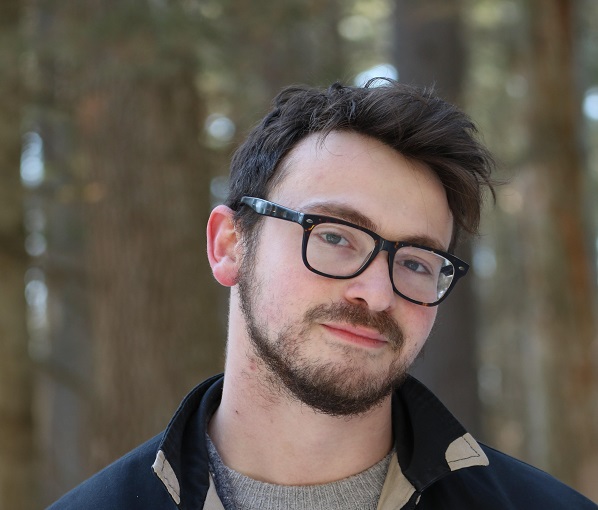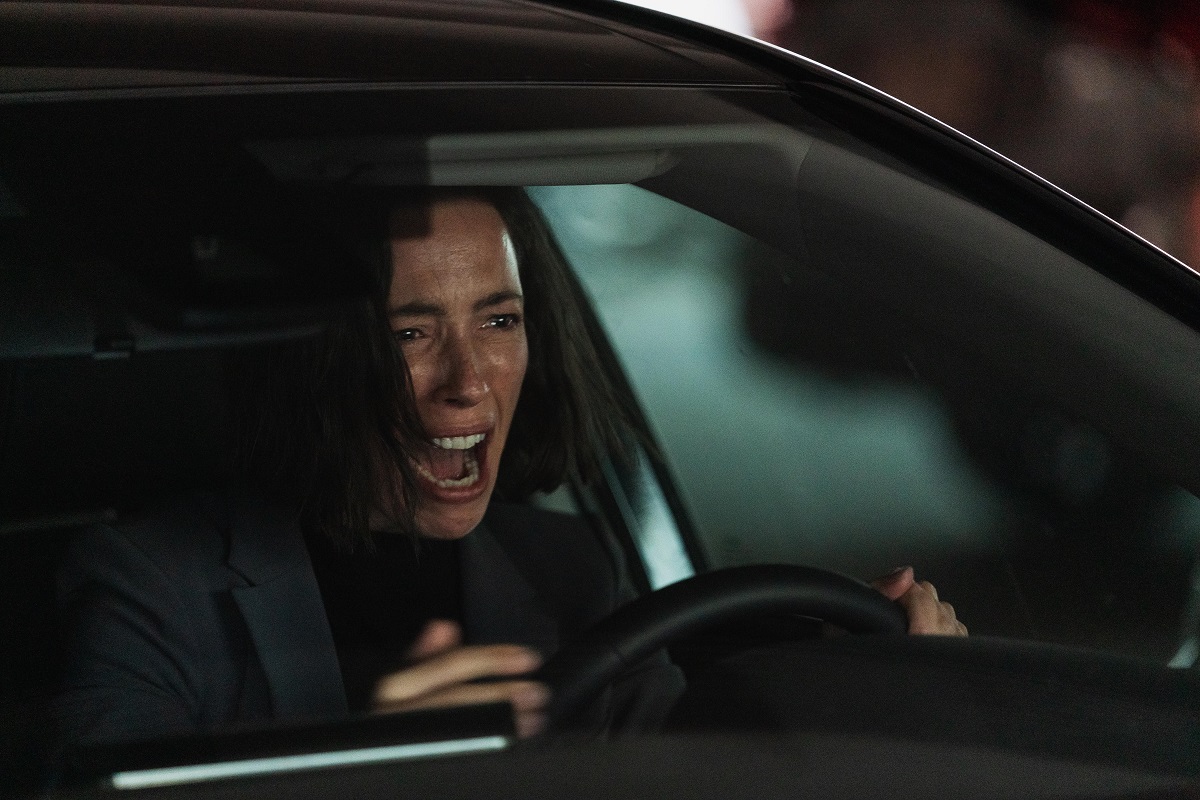Hot off the critical success of last year’s “Passing,” her feature directorial debut, the British actress and filmmaker Rebecca Hall returns to theaters with Andrew Semans’ “Resurrection,” out Friday.
In this paranoid psychodrama, a potent showcase for her destabilizing screen presence, Hall plays Margaret, a single mother living in upstate New York. With her teenage daughter (Grace Kaufman) bound for college, Margaret’s reluctantly bracing for change. But the sense of control she otherwise exacts over her daily routine—at work, where she’s a high-achieving biotech exec; at home, where everything is sleek and spotless; and even between the two, along running routes she dominates like an Olympic sprinter—is shattered when Margaret attends a work conference and spots among the attendees David (Tim Roth), a mysterious man from her past.
It’s unclear what so perturbs Margaret about David, though her anxiety spikes as he starts showing up all over town. Early efforts to get the police involved reveal that Margaret was once in a relationship with the much-older man, though she’s at a loss to explain his reappearance 20 years later. Behind the camera, Semans (previously best known for another thriller, 2012’s “Nancy, Please”) plays similarly coy. His chilly, precise visual scheme places viewers inside Margaret’s deteriorating headspace, not betraying her perspective even as “Resurrection” shifts into a more unsettling, surrealistic experience.
The moment of transformation—for Margaret, and “Resurrection” as a whole—comes in the form of an eight-minute monologue, delivered direct-to-camera by Hall in a single tour-de-force take, as she discloses the truth of her history with David. As Margaret’s story unfolds, it grows sad, strange, and fantastically grotesque—but the clarity and conviction with which Hall delivers each line is enough to ground the most implausibly traumatic of her horrors in psychological truth.
Where “Resurrection” goes from there is best left for audiences to discover, though the film’s nightmarish exploration of parental anxieties and emotional abuse also resists easy explication by design. “Whether you know what’s going on, like it, or don’t like it, you’re not going to forget about it,” promises Hall. “If this film is forgettable,” Semans agrees, “We have failed.”
After premiering at this year’s virtual Sundance and visiting other stateside fests (including May’s edition of the Chicago Critics Film Festival), “Resurrection” hits theaters July 29, followed by a VOD rollout August 5. To mark the occasion, Hall and Semans sat down with RogerEbert.com to discuss cinematic ambiguity, the art of the monologue, and belief in the extreme.
Rebecca, we last spoke in Chicago about “Passing.” Though that film exists a world away from “Resurrection,” both are psychological dramas, steeped in ambiguity, involving the appearance of a figure from one’s past and the destabilizing effect that has on their carefully constructed life…
REBECCA HALL: I have some themes I’m interested in, clearly. It’s interesting that you point out the similarities, because I wouldn’t have thought there are any, but of course there are. The thing is that I like an interpretable text: something that requires work to have the fullest-possible experience of it. I don’t like it when a movie—or even a piece of art, particularly—has a message that it’s trying to strictly drum down your throat.
A film like “Resurrection” is fascinating to me, because it’s a cinematic experience in the sense that you’re going to go in, go through something, and come out feeling things. Extreme films with outlandish promises can have that effect, and films that are very contained, with everything just under the surface, can have that effect. I love finding where that happens.
“Resurrection” could absolutely be described as an interpretable text. Andrew, where does that instinct toward ambiguity come from, for you as a filmmaker?
ANDREW SEMANS: I’m always drawn to stories that don’t spell everything out for the audience, that give you the freedom and the autonomy to interpret things in your own way. As long as it feels earned, as long as it feels consistent thematically, emotionally, and psychologically—and as long as it doesn’t feel like a cop out, as if the writer just didn’t know how to tie up all the various ends of their story—provocative and substantial ambiguity is so enjoyable. As a viewer, it gives me something to chew on. I like the feeling of being unconscious of the writer or director, being alive in the film or in the text—that there are things left wild.

Margaret has such fury, but also this deep sense of despair, guilt, and self-hatred. How does one map out the interior life of a character this tightly wound?
AS: Every decision she makes, the way she structures her life in all aspects, is an outgrowth or response to—and the residue or consequences of—her past, emotionally and psychologically. Everything she does is in some way an effort to keep the wolves at bay, to keep her demons in check. Her ostensible confidence, strength, and control of her environment is an effort to control that which is in her that frightens her, and which that she’s always worried is going to reemerge and fill her with anguish.
I tried to make that feel coherent in terms of her relationships, her job, and her home, that her past was always present and motivating her. In the script, there were more illusions in the first act to her past, her efforts to overcome it, and how she’s haunted. But because Rebecca was so amazing at communicating this character’s strength and fragility at the same time, we ended up needing less than we thought in terms of indicators that there was something going on below the surface.
RH: Counterintuitively, it’s easier to portray huge emotions of any kind. Margaret is walking around with huge amounts of rage and terror. It’s easier to portray those in opposition; if you’re portraying someone who’s trying to hide those things, you weirdly draw attention to them more than if you’re playing them. Suppressing anger, terror, anxiety, and panic is a more direct line to expressing it. Why? I’ve got no idea. But it tends to work and have more of an emotional impact, I suppose, because all of us are struggling with these things. All of us are on some level trying to hide these things, get through life, and show the world we’re okay.
What hooks me in about “Resurrection,” specifically, is that it’s about someone who was in a cult of one and was gaslit, controlled, and abused horrifically—and so on some level, it is about that. But on another level, it’s not a message film. It’s not saying, “This is what we as a society should or shouldn’t do about this.” And nor is it really a “Let’s look at the effect of this” film. It’s a film that’s getting into the emotion of it. In doing that, it hits upon something universal, which is not to do with being in an abusive relationship.
I’m a parent myself, to a young child. When people have children, along with all the wonder, comes something which can only really be described as pure existential terror. [laughs] I’m being silly, but it is real, because you’re suddenly confronted with a human being who it’s your responsibility to keep safe. And every day you’re dealing with everything that’s wonderful about life and simultaneously wondering, “Are they going to be okay? Can I keep them safe forever?”
“Resurrection” takes that feeling and blows it up to the most extreme version of that, so you can really interrogate that feeling. That’s why it gets under everyone’s skin. Plenty of people have been in abusive relationships, but all of us can relate to this feeling of creeping panic.
Andrew, your script made the 2019 Black List; you’ve been with this story for a long while. What’s been on your mind most about “Resurrection” recently?
AS: Well, one thing that’s very much on my mind right now is I’m about to have a baby. [laughs] When we made the movie, I was not a parent, but this is a movie about fears and anxieties around parenting, among other things. Those worries that you won’t be able to keep your child safe or be a good parent… Those were all speculative when I was making the movie, thinking, “What kind of parent will I be?” I’m not quite yet a parent, but all the feelings that I’ve been experiencing lately have confirmed to me that my instincts were correct. At least for me, the fears depicted in this movie are based in truth. Being a parent is, among other wonderful things, a truly harrowing experience, because you’re always in a state of fear.

I felt uneasy watching “Resurrection” from the start, but I was still floored by the intensity of that monologue around the half-hour mark, during which Margaret unburdens the darkness of her past to Gwyn, her intern. How does one prepare for a sequence like that?
AS: We had to shoot it in one take, because cutting away would destroy the moment. That was a very scary thing to do, because if you have a seven- or eight-minute monologue in a single take, you’re dead in the water if it’s not done well. Luckily, we had Rebecca. As she recounts this story from her past, something so strange and harrowing, she’s increasingly entering into the space of her memory. And so everything around her is falling away. It gradually goes dark around her and pushes in until there’s just nothing but this face, this experience, this story. Everything else is void. And when she’s done, the real world rushes back in.
RH: In many ways, that boldness was what made me trust Andrew most. He said to me, “That monologue will have no flashbacks. There will be no cutaways to the reverse.” Nobody does that. Everyone cuts. Now, how did I prepare for it? I don’t know. You just have to believe. I don’t prepare in the sense of looking in my mirror and working out how best to say a line. I’m not conscious of my face or voice. I’m just concentrating on believing what I’m saying. And then what happens, happens. That’s my policy.
Within that, there has to be a line of logic. You have to make sure that you hit the right timing, that there are cadences and rhythms. The pace, or lack of—and the moments to pause, to think—were quite specifically charted in my head. She’s experiencing memories, and there are memories that are more or less painful; when you hit them, the emotions come or they don’t, because you’re trying to suppress them. Acting is very weird.
As Margaret’s past reappears, it’s also fascinating to see these ripples in how she starts to manipulate those around her, especially the young women in her life.
RH: That’s another reason I found it credible, that Andrew was bold enough to write this character so honestly. I was fascinated by Margaret’s relationship with her intern. She’s this person giving you a job, then all this emotional advice that’s useful on some level, but she’s also slightly getting off on how good she is at giving advice. It’s controlling, and then she dumps a huge amount of information on this poor girl, just because she can. She has more power.
That act is fairly abusive, as is the way she parents her child. As things get worse, she gets more controlling, and that is also problematic. The repetition of abuse is subtly woven into this narrative in a way that feels real, but then you also have these outlandish elements, which push it toward something epic, almost mythological. There is this ultimate retribution. Here, we have a woman with such rage, and she has a way to express that in the end that feels very primal. You couldn’t get to that level of primal without the extremity of the story.
Andrew, ’70s conspiracy thrillers like “Klute” and “The Conversation” influenced this film, but you’ve also referenced Todd Haynes’ “Safe” as a major inspiration.
AS: I reference “Safe” all the time, because it’s possibly my favorite movie of all time. I have such a strong emotional reaction to “Safe,” though it’s so austere, partially because it’s the best evocation of generalized anxiety I’ve seen. As an anxious person, that means something to me. When I first saw it, it blew me away, because it was a movie that employed techniques, imagery, and tropes from horror movies and thrillers, but it’s not horror and it’s not a thriller. It engages with that style to tell a dramatic story with elements of satire. I saw it when I was young, and it had never occurred to me that you could employ these techniques in a non-horror, non-thriller space. It was the first movie I’d ever seen that felt so stripped-down and austere. It all takes place in these incredibly mundane spaces that are somehow imbued with a sense of threat or paranoia, but never overtly. It’s a very elegantly made movie. And it’s all structured around this absolutely extraordinary central performance by Julianne Moore, which still blows me away.
This sense of surveillance, as well, is so palpable, to the degree it poisons the film’s atmosphere. I felt a similar dread watching “Resurrection.”
AS: Our whole movie takes place in these very generic settings: apartment, department store, office, hotel room. We wanted this sense of an objective reality. At the same time, we wanted to imbue that banality with an insidious sense of surveillance, of something coming. With every scene, it was a slightly different strategy to make it feel subtle, as if it’s slipping in unconsciously.
Rebecca, after “The Night House” and “Resurrection,” I’ve seen certain quarters hailing you as a scream queen, but it seems to me more like you’re just finding psychologically complex roles in horror, as opposed to deliberately seeking it out.
RH: Completely! As a filmmaker, I’m not running to make horror. It’s not a genre that I’m obsessed with, at all. What it is, purely, is this: If I want to be fully utilized and pushed as an actor, that is often where those parts are. I’ve gravitated towards them because I know they will be challenging. It doesn’t have to always be this way. I don’t want to be the extreme-sports version of an actor, as if I need bigger mountains and more! More! I can’t do that. Not possible. I would give anything to do a light rom-com. [laughs] That would be satisfying in a different way.
Has making your first feature film changed what you seek out as an actor?
RH: I’ve always approached acting more like a director. I’m fascinated in how the story is told. I’m not exclusively interested in the part that I’m playing. I want to know how everything is crafted. I’ve always been very conscious and respectful of the process. I don’t waste people’s time when I know that there are only a short amount of days. I believe in doing the work ahead of the shoot, to make everything as easy as possible for these productions that have to shoot in 20 days with no money. I had all of that before “Passing.” In the moment of taking “Resurrection,” I definitely had a need to do something performatively that felt as fulfilling as directing had felt to me. I needed something extreme at that moment, to get me fired up about acting again. This fit the bill.
“Resurrection” hits theaters July 29 and VOD August 5.












